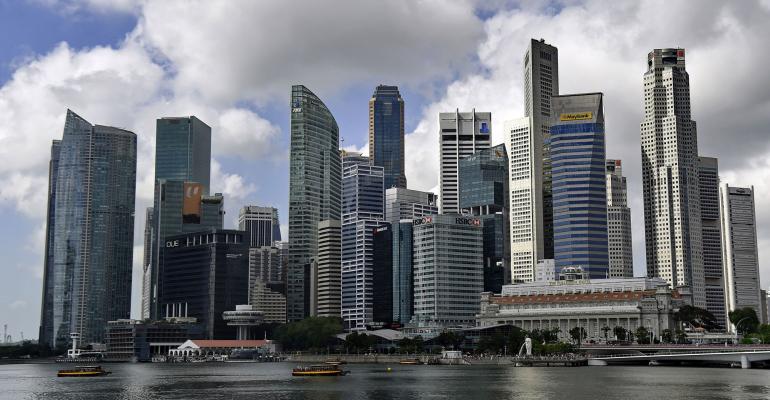(Bloomberg) -- Singapore is becoming a hub for the property-management industry: It has more foreign REITs than anywhere else in the world, and the companies’ importance on the nation’s benchmark equity index is the highest it’s ever been.
Since the city-state saw the first share sale of a real estate investment trust in 2002, it has pocketed 41 IPOs of such firms -- including seven foreign-currency-denominated ones. In comparison, Hong Kong, the world’s top initial public offering venue last year, has just had 11 since then, according to Bloomberg-compiled data.
The country’s favorable tax regime and well-established legal system made it particularly appealing for international investment trusts. Being commercially flexible and open to tweaking its regulations has allowed Singapore to continue to lead in the area, according to Ee Kean Wong, capital markets partner at WongPartnership LLP.
The hunt for yield has certainly helped boost the allure of the trusts as global central banks keep lowering interest rates to fend off an economic slowdown, and to contain the coronavirus outbreak that has so far killed some 2,500 people. With a yield of 6.2% -- one of the highest globally -- Singapore-listed REITs are sought after and more frequently traded by investors than most of the blue-chip stocks in the country.
The importance of REITs has also shown up in their Straits Times Index weighting, which has doubled over the last five years. Here is a look at how property managers are becoming more significant to Singapore’s financial market:
Initial Public Offerings

The city-state’s journey to become a REIT hub started in 2002, with the first investment trust IPO from CapitaLand Mall Trust. Its market capitalization has since jumped 16 times to $6.6 billion, data compiled by Bloomberg show, as it keeps issuing new shares.
Singapore’s reliance on REIT listings has grown steadily. They account for the majority of IPO proceeds in three of the last five years. More foreign investment trusts have flocked to the city-state, with the recent pound-denominated Elite Commercial REIT being the first of its kind to be sold there.
“The investing community here will always have an appetite for REITs, given the attractive yields they offer,” said Jin Rui Oh, a Singapore-based director at United First Partners.
Yields

Singapore-listed investment trusts boast an average forward dividend yield of 6.2%, one of the best globally, according to Bloomberg-compiled data. Meanwhile, they also give out the highest payout among all sectors in the Straits Times Index.
Performance

These REITs have outperformed the city-state’s benchmark index by a wide margin in the past two years, as the nation’s investors have a penchant for high-dividend stocks. The FTSE Straits Times REIT Index has gained 18%, compared with a drop of 9.4% for the Straits Times Index. The former reached a 12-year high this month.
Trading Volume

Property-manager stocks have attracted significant trading over the years, taking five spots out of the top 10 most-active shares in the Straits Times Index, according to Bloomberg-compiled data. By contrast, DBS Group Holdings Ltd., the largest bank in Southeast Asia by assets, and Keppel Corp Ltd., an infrastructure-to-property conglomerate, rank 15th and 17th, respectively.
Singapore’s 43 property trusts contribute 26% of the stock market’s year-to-date average daily turnover, according to a market update from the Singapore Exchange.
“With the growing popularity of REITs among investors, more listings by these trust can help to improve the market turnover,” said United First’s Oh. “It works when there are a variety of offerings to appeal to the diverse group of investors, allowing them to rotate into different sectors.”
Index Weight

As REIT listings rise, their weighting on the Straits Times Index has grown to 11% in 2020 from less than 5% in 2015, according to Bloomberg-compiled data.
“With the successful listing of Manulife US REIT, Cromwell European REIT, Prime US REIT, and Elite Commercial REIT in Singapore, we can expect more international REITs to follow suit in the years to come,” Oh added
(Adds more turnover details in second paragraph in ‘Trading Volume’ section)
--With assistance from Cecile Vannucci.
To contact the reporter on this story:
Zhen Hao Toh in Singapore at [email protected]
To contact the editor responsible for this story:
Lianting Tu at [email protected]
© 2020 Bloomberg L.P.





